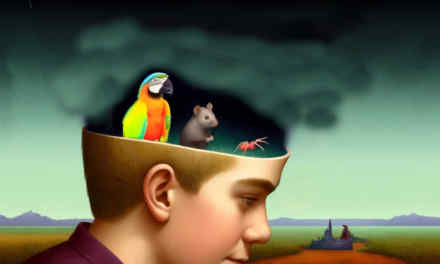I look through the adult section of the city classifieds until I see the code phrase: “exotic and wild.” The address is in a part of the city where people with jobs and families and clean clothes never go.
Quietly, I make my way through the dark night, passing under broken street lamps, between empty lots filled with trash and gutted buildings taken over by squatters, to a run-down two-family house. A single light is on upstairs.
I crouch down and push off with my powerful legs. In a few silent, long arcs, I leap through the alley between the house and the warehouse next to it until I’m in the backyard. Nobody has noticed me. My skin is clammy again, and I take a large gulp of water to keep myself hydrated.
I pick up a rock from the ground and climb up the back stairs, moving slowly so as to minimize any noise, until I’m on the second-floor landing. In front of me is a door with a glass window, and I squat and slowly lift my head until I’m peeking into the kitchen. A man is playing with his phone while a TV drones on in the background. There’s a cash box on the kitchen table.
I shuffle to the other side of the landing and look into the window of the bedroom.
A man is riding a pony girl. She has strong legs and long, smooth, black hair. He wields a cane and the crisp slap of it against her skin is louder than the sound of the TV in the next room. She cries out and the bit in her mouth muffles her. But the expression in her eyes is resigned. I shuffle back to the other side of the landing.
One, I break the glass window with the rock in my hand. Two, I reach in and unlock the kitchen door. Three, with one leap, I’m inside.
The man looks up from the screen of his phone. Before he can speak I grab him by his hair and slam his head into the table. He crumples onto the floor. I take all the money in the cash box. I scan the kitchen shelves and find a bottle of green pills, which I take with me.
I shuffle into the hallway and open the door to the bedroom. The john is still on her, his face frozen halfway between terror and pleasure. A loud, whirring space heater keeps the room warm. The stagnant air stinks of sweat, sex, and tobacco ashes.
“Get out,” I tell him. Naked, he scrambles past me and disappears down the hall.
I hand the ponygirl the bottle of green pills. “Run and hide.”
I expect her to shrink away, curl up in the corner, and hide her face. That’s usually what werks do after I disable their owners. Most of them are too low-functioning to really understand what’s happening, and even the high-functioning ones, like birds caged for too long or dogs kicked too often, can’t act. Though the risk of being discovered increases with every extra minute I linger at the scene of the crime, I always feel compelled — like I’m acting out a script —to stay and caress the werks, whispering to them again and again that they have to get up and go, and learn to live in the world out there. Often, they won’t leave no matter what I tell them, and I have to leave them behind to be recaptured.
But the ponygirl does not shrink away. She unties the bridle from around her head, spits out the bit, and drops the bundle of metal and leather on the ground. Slowly, she stands up before me, naked, breathing hard. Her nostrils flare open. In the dim light of the bedroom I can see dark stripes and whorls etched against her pale skin: Blaschko’s lines. Scars made by whips crisscross her breasts.
“Thank you,” she says. Her voice is low, hoarse, but her speech is clear. She’s very high-functioning, clearly intended for those with sophisticated palates, and it surprises me a bit to find her here, in a back alley brothel. A strong jaw dominates her long face, striking rather than beautiful. She looks directly at me with her dark irises, which fill up most of her eyes, leaving little white. “I’m Ella.”
“I’m Jack,” I answer. The name is a bit of a joke from Hazel, my former owner, who liked watching me doing jumping jacks for hours. “Were you made from a horse?” I ask, my eyes taking in her strong, thick nails and stubby fingers.
“A zebra,” she says. She smiles, and I can see her flat teeth, much too large. “You?”
“A frog.” I lift a hand, remove my gloves, and show her the scars where I cut away the webbing between my fingers. She nods.
“Can I stay with you? I have nowhere to go.”
* * *
I have no memories of Thailand, of the hidden basement lab where I must have been made.
A werk is a work of art. It is a chimera made from the genetic material of two zygotes, a mixture of tissues from two species. It is a creature sprung from the mind and curiosity of Man.
Werks make popular pets, and some varieties, designed with the industrial farms in mind, are excellent sources of protein.
A werk made from a human zygote and a zygote from another animal, of course, is very much illegal. But making things illegal has rarely prevented them from being made. In the great flesh markets of Bangkok, every desire can be satisfied. When you have tasted every delight, the mind—and body—yearns for the truly exotic.
I imagine my creation: a frog zygote and a human zygote, stolen from a fertility clinic, are placed in a Petri dish. They fuse. Then come the drugs and a few months of hypergrowth. I am a giant mutating tumor whose biological essence is an impossible dream at war with itself.
* * *
I give Ella the bed in my tiny studio apartment and an old bathrobe to sleep in. A sheet on the floor suffices for me. Her smell, warm, sweaty, alive, is calming. I’m startled to realize that I like the sensation of having another body so close to me. I’ve lived for so long without it that I didn’t even know I missed it.
It’s just for a few nights. Until she can be on her own.
We take our pills and I drink a gallon of water. It’s summer so I leave the window open and the breeze feels nice as the moisture beads on my skin.
The open window also allows us to hear approaching sirens, heavy boots pounding the sidewalk, or the eerie quiet that indicates roadblocks cordoning off the neighborhood. To survive as a feral werk one must be constantly vigilant.
Sounds from my neighbor’s too-loud TV penetrate the thin walls and fill my dark apartment.
“Report sightings of suspected illegal werks constructed with human genetic material. Your country and fellow citizens thank you.”
That’s the voice of Senator Leo Sterse, who’s been calling for more resources to be devoted to the capture of illegal werks. They say he has presidential ambitions, and this is an easy cause with which to get votes.
I’ve seen and heard this public service announcement so often that I can play the visuals in my mind. Images of dark alleys and shadowy labs in Asian cities flash on screen, accompanied by menacing music and the text: “Danger to Our Shores.” The scene shifts to captured runaways, their faces vacant, skin ravished by STDs. One of them snarls at the camera, revealing a mouth full of sharp teeth.
“Want me to bang on his door and tell him to keep it down?” I ask.
“It’s all right,” Ella says. “No need to draw attention to ourselves.”
Senator Sterse’s stentorian voice continues next door, “Don’t let them suffer from your misplaced compassion.” It’s a deep voice, one that should inspire trust. But hearing it makes my jaws clench, the skin on my back tingle.
I can imagine the images that fill the screen for the next ten seconds: werks lying in the gutters, under bridges, their horribly deformed bodies oozing blood, their limbs twitching in the air because they couldn’t get the little green pills from their owners, the pills that suppressed the war among their genes. The PSA’s one-two punch is well constructed: first he scares you, then he tells you the werks will be grateful if you turn them in. There is no explanation for what happens to the captured werks.
Senator Sterse’s voice then explains that although werks may display signs of human behavior like rudimentary speech, they are merely acts of mimicry. Dogs and goldfish in man’s skin, that’s all werks are. “Don’t let appearances fool you. Always report illegal werks.”
Sex is never explicitly mentioned in these ads.
I can picture the Senator in my mind, though these days I always turn away when his face flickers onto a screen — not because he’s ugly; far from it, he’s a very good looking man: well-dressed, seductive, and I can’t help but feel a liking for him when I look into his eyes, despite the revulsion in me, almost like I’m bonded to him. I was the same way with Hazel, my former owner.
I get up, go to the bathroom, and tear off pieces of toilet paper. I roll them up and stuff the balls in my ears. Coming back in the dark, I can see Ella’s face in the moonlight. Her elongated, cup-shaped ears twitch ever so slightly. I hand her a few more sheets of toilet paper so she can make her own earplugs. Thank you, she mouths silently.
The helpless trust in her expression startles me because it seems so familiar. I must have looked like that once too.
* * *
Most sexwerks are very stupid. The tabula rasa of their hybrid brains has no time to mature or become interesting; they are toys fit only for the undiscerning.
Techniques have been devised to implant memories and personality traits to entertain more demanding owners. Human memories collected from donors are layered on top of animal reflexes and instincts in a palimpsest. The combination spices the play.
Who are these donors, snippets of whose minds now inhabit sex toys? Are they prostitutes or slaves little freer than us? Technicians employed at the labs? Are they tourists who think of their donation as a lark, a fun joke on holiday?
While the human and frog zygotes gave me my cells and instincts, they’re only the biological substratum in which the thoughts of my memory donor took root and blossomed. Finding my memory donor has become my obsession, only a little less important than food, shelter, the pills and not being found.
The memories implanted in me were cleansed of personally identifying details. My donor was the stencil, and I was an imperfect print. The goal, after all, was to endow me with skills — language, sexual technique, emotional understanding — not to give me a real life. Yet in dreams I can see fragments, obscure and incoherent, of faces and events from his life, tantalizingly out of reach, like a photo mosaic that I’m too close to make sense of.
My mind is a jumble of the shards of a past I never had filtered through the interpreted qualia of a nonhuman consciousness: the desire to burrow into the mud confused with the desire to burrow under thick blankets in northern winters, the taste of mosquitoes, kisses in darkness, an emerald underwater dusk, snippets of love poems memorized to impress old girlfriends, bubbles that coagulate in the oily water, fingers that seem to know on their own how to stroke the keys of a piano as well as a pair of breasts. I’m a frog who remembers going to college, or a man who imagines once having gills.
My life will not make sense until I know the man whose mind inhabits my head.
* * *
In the morning I begin to teach Ella how to pass. She can’t stay with me for too long. The neighbors will get suspicious and report me to the landlord for violating the lease provision about single occupancy.
First, I steal some clothes from the laundromat around the corner for her. The features that will give her away the most easily are her eyes, ears and fingers. She needs sunglasses and a hat worn low to cover her ears. I also give her a pair of my mittens — odd to wear them in summer, but it can’t be helped.
I take her out to shop for food so she can get used to being out in public. Given her high mental capacity, I imagine she was made as the plaything for someone very wealthy and kept hidden most of her life — until he tired of her and sold her.
At first she clutches my arm, full of fear, as we walk among the bustling crowd on the sidewalks and take the subway. But after a while she grows more relaxed, realizing that people aren’t paying her any attention. She turns out to be literate, like me, and recalls quite a bit of general knowledge about the world from her donor.
We buy peas, carrots, tomatoes, anything from the produce section that Ella finds interesting. Whenever I see a man whose gaze seems to linger on us, to be appraising us, I nudge Ella discreetly and we move into the next aisle. If the man follows us, we leave the store immediately.
We don’t buy anything that’s a chimera. We especially avoid the rotisserie section, filled with the smell of roasted beefpork.
Then we go to the park, where I dig for worms and catch dragonflies by the pond. I like the smell of the pond, a combination of rotting vegetation and sun-kissed mud. We stay for a while. When we think no one is watching us, Ella picks blades of grass to chew on. She giggles because the grass tickles her nose, and it’s a lovely sound that makes me laugh too. I show her how I can make my eyes bulge out, like they’re falling out of my face, and she shrieks with laughter and covers her mouth.
I don’t remember if I ever laughed like that.
On the way home we stop by the window display of a pet shop: “We have marvelous werks. Friendly, curious, cuddly and exotic, no two are the same!” Through the window we see children picking up and cuddling the occupants of cages: a pouncing cat with floppy rabbit ears, a fox with a peacock tail, a hamster with miniature goat horns.
Ella’s hat has moved up, revealing her ears. I can see them twitch and her nostrils flare as she watches the pets and the children.
“You want to be careful about those tics,” I tell her. She nods and pulls the hat down.
“Do you ever think about owning one?” She asks.
“No.”
“I’d like to own one someday. If I have my own werk, it’ll make me feel … real — less like one of them. I’d be good to it. Really gentle.”
A clerk waves for us to come in. I shake my head and we walk away.
When we’re home I put everything on plates for us to share. She has a good appetite and tries a bit of everything, even the worms, which I caught mainly for myself. Neither of us uses silverware. Ella eats straight from the plate, almost like she’s grazing.
After dinner we clean up together. I wash the dishes and she dries them with a towel. She watches the scars along my fingers.
“Did it hurt when you cut … your hand?”
Oh yes. I had cut through the webbing with a dull kitchen knife, taken from my first victim — his werk was so stupid that it could barely talk — and my hands bled for weeks. “No, not really. At least I don’t remember it.”
“How long have you been passing?”
I think about this. “Two years … and change.” I don’t remember the exact date of my escape. My own memories, the real ones, seem less substantial than the ghosts that were implanted in me.
“Do you —” she hesitates, trying to find the right words, “— make all your money by doing what you did yesterday?”
“Not all of it. Sometimes I beg on the street.”
In a few days, when she’s more confident, I’ll take her to look for an apartment. I guess she’ll have to find some way to make money and get the pills. She might be able to get a job as a cleaning woman, or, if she’s willing to take the risk, advertise herself online as a prostitute. The thought bothers me. It’s really none of my concern what she does, yet I feel responsible for her. Something about her makes me care. It’s a new sensation: not as though I own her, but like I want to have her around and hear her laugh, as often as I can.
“Have you rescued many werks?” She pauses, and then adds, “thank you.”
I plunge my hands into the hot, lemon-scented, soapy water while I consider her question. I attack the owners of sexwerks — not just pimps like Ella’s, though they make the easiest targets, but also people like my Hazel — to get the pills and money, and I do not know if many of the werks see me as a rescuer. Who knows if many of them (or any of them) even want to be freed? They might well view their owners with affection and devotion. Out of nowhere, I emerge and thrust them into this world where they must make their own way, like me. I do not know how many, if any, ever succeed. Certainly none of them have ever thanked me, as Ella did.
I admit that there’s a bit of truth to Senator Sterse’s slogans.
Yet I feel compelled to free them too. I get a rush from doing it. It’s as though I’m living out some fantasy of being a hero. Maybe it’s a fantasy I inherited from my donor.
“I’m sorry if you don’t want to answer that,” Ella says. “I don’t mean anything by it. I just wondered if you usually have the werks you rescue live with you.”
“You’re the first.”
After dinner we watch TV. After a while she leans into me, pressing the gentle swell of her breasts against my side, and I put my arm around her, cupping my fingers softly around her breast, remembering the scars.
I look down and see that her face is caught between fear and hope, as though sex is the only way she knows how to touch and be touched.
“You’re free,” I whisper to her, and gently loosen my arm from around her, giving her a circle of emptiness, of space.
She takes a deep breath and turns her face up for a kiss. And after only a moment of hesitation, I do.
The smell of her hair fills my lungs, and I know I should feel happier than I have in a long time. But something about her feels both familiar and dangerous, like a half-remembered nightmare.
* * *
I must admit that Hazel was a good owner for the most part, and I know she loved me.
The first real memory I have is of the moment she came to pick me up. She walked into the room where I was sitting up on the bed, a sheet draped over my body. I was cold, and shivering. My skin felt terribly dry.
“Oh, it’s wonderful!” she said, looking at the technician in the room. “Can he, it, talk?”
“It’s still a bit groggy from the delivery flight. It should be able to understand simple voice commands now and get more affectionate as it bonds with you. More memories will come back to it over time. He’ll know how to do things.” The technician chuckled lasciviously. “Especially with that tongue.”
Hazel took me home and fed me with a spoon and dressed me like a doll. I was a beautiful toy, shiny and golden, the frog she made into a prince. She couldn’t keep her hands off me. She led me around her house, talking to me, showing me the toilet, the pool, the sundeck.
Gradually, memories implanted in me awoke. I remembered that this was how you got dressed and undressed; this was how you danced and gave a massage; and this was how you made love.
Hazel loved to see me do “froggy things.” She enjoyed observing how far I could jump, how damp my skin was, how I could catch flies with a flick of my tongue, how I could swim so fast. The more of my frog nature I demonstrated, the more she was pleased.
Sometimes, at night, she would keep me in her bed. Other times, when she had guests, she led me down to the basement, where there was a chain with an iron collar, and a plastic kiddie pool half filled with water. She would put her finger on her lips — “shhhhh” — before she closed the door and went upstairs.
Sometimes she kissed me. Sometimes — not often — she whipped me. There was pleasure for her in both.
My body is both frog and man. My mind is full of the shadows taken from a man I never met, called forth by a woman who wished to own a thing that was halfway between human and animal.
And I ask, under all this, where is the real me?
* * *
I wake. Immediately I grab the sketchpad next to me and, in the pale light of dawn, I try to capture the faces I saw in my dreams before they fade.
I have filled a stack of notepads with these pictures, faces taken from the memories of my donor: childhood friends, high school sweethearts, porn stars who caught his fancy, parents, grandparents, men he admired. Perhaps one of the faces I glimpsed in my dreams is even his own, seen in a mirror and then airbrushed by his ego.
Ella wakes up. I ignore her as I continue to sketch. She gets out of bed and crouches next to me. “I don’t see faces like that,” she says. “I remember lots of things: learning to ride a bike, reading novels, dancing. But no faces or places.”
That makes sense. She’s a newer model. The techniques for obscuring donor memories to strip out irrelevant personal details have gotten better over time.
“You really want to find him, don’t you? But why?”
I suppose it’s a bit like any child’s desire to understand where he came from, in whose image he was made. I believe that finding my donor will finally explain my life, show me who I am. Some people believe that individuals, families, nations, and races are the prisoners of history, that people’s lives and actions are dictated by dark compulsions and ancient memories that they are powerless to escape. Perhaps that’s only a metaphor for humans, but I feel it is literally true for me.
“I want to know why I do what I do,” I say.
Ella looks through my sketches. “Have you ever identified any of these people?”
I shake my head. I am not a very good artist — from which I deduce that my donor wasn’t one either — and the faces I see in my dreams are out of focus, soft around the edges, and they slip away from my mind so quickly after I wake up, like water through a sieve. I know some of the faces are famous, and yet no matter how hard I try, I’ve never been able to capture a face that I can match on TV or the web.
It’s no use. I’ve been awake for too long. I stop sketching.
“Would you give me one of your books?” Ella asks hesitantly.
“Why?”
“I won’t be with you always. I’d like something to remember you by. Like I said, I don’t dream of faces.”
It is like parting with a part of myself. Yet, as I hand her the sketchbook, I feel happy. These faces have haunted me for so long, but it’s only at this moment, when I give them away, that I feel they belong to me rather than I to them.
* * *
In the middle of the night, I straddled the windowsill, ready to jump.
“Come over here,” Hazel said.
She was sitting up in bed, her back propped up by pillows. Her gnarled fingers were crossed in her lap. “You love me,” she said, contented.
But then I saw that her eyes weren’t open.
She had told me how alone she was, how disappointed she had been with the succession of men she dated. She had money and power and a large house in which to hide things, yet somehow her life had turned into a cliché: she had no affection.
But what finally made her decide that she wanted a werk? The danger, the frisson of desire and fear of the forbidden? She was a real person, and real people understood why they did things.
Not like me, a mere toy. I didn’t even know why I wanted to run away, only that I felt I had to.
I jumped. But I had miscalculated the strength of my legs, which were not as strong as my frog instincts expected. A moment later, pain shot up my legs like they were on fire. I was lucky that nothing broke. I limped away in the dark.
I pity Hazel now. I think of her, alone in her house. I think of her frantically searching for me, and then waiting in anxiety, dreading the moment my inevitable discovery is linked back to her.
It’s possible that even she did not know why she wanted a werk, but only felt compelled to own something warm and alive. It’s nice to be next to something warm, alive, to demonstrate mastery over it, to feel human by contrast with something not human.
She should have gotten a werkdog. They are much more loyal.
* * *
Thoughtful men and women debate about werks like me: What is our legal status? Are we persons or possessions? Should we be deported back to the urban jungles of Asia — where the tourist can continue to sample us — or confiscated and perhaps destroyed as contraband? Are we more like manufactured machines or animals?
One thing is clear: the public does not want to be reminded of our existence, of the decadence of their fellow citizens with the appetite and the resources to design us, to fill out order forms and wire money offshore. People do not want to think about what rewards could motivate men to risk prison to transport such abominations into hidden rooms here. The shame cannot be borne. It’s imperative that we be found, collected, and made to disappear.
And so Senator Sterse makes his speeches, and we become nightmares that scare good little boys and girls.
No one knows why werks go feral. Many, like me, escape. Others are abandoned after owners tire of them. Most feral werks hide in slums, scared and lonely, yet they always seem to yearn for human company, and their pathetic trust makes them easy to capture.
It is the same with me. Sometimes in dreams I see Hazel coming to me with my leash. “Oh, there you are,” she would say. “I’ve looked everywhere for you.” And I don’t run away, in my dreams.
It is a defect with our nature. We have no minds of our own.
* * *
I wake.
In a second, Ella is by my side on the floor. She pushes on my shoulders until I’m lying back down again.
“Let me help you remember,” she says. She holds the sketchbook I gave her before my eyes and flips through it. “Tell me when you see a face that you just saw in the dream.”
I tell her to stop at a drawing of a woman with shoulder-length light-colored hair and a gaunt face, with a nose that’s a bit crooked. There are many drawings of her in my sketchbooks. Ella scrutinizes the drawing.
“Close your eyes and try to recall this face.”
I close my eyes. I feel Ella’s hands caressing my face, fluttering over my eyelids, gently applying pressure to my forehead and brows with her knuckles.
“But don’t focus on the face. Try to extend your attention to the space around the face, the scene.”
This is something I’ve never tried. Usually I’m so focused on the faces that I don’t pay any attention to the other details at all.
“She’s standing in front of a house. In the driveway.”
Ella continues to stroke my face, relaxing my jaws. “Don’t try too hard. Let the details fill themselves.”
I let my attention wander. “There’s a mailbox by the driveway.”
She continues to stroke my face with her strong, stubby fingers, her thick nails pressing against my cheeks. I can tell she’s excited too.
“I can see a number on the mailbox, 72. And a name.”
The letters on the mailbox stay just out of reach. No matter how hard I try I can’t read them.
“Try to see if the first letter is an A, or a B, or a C … Work your way through the alphabet. But don’t push it. Try to pay attention and at the same time not pay attention, like you’re trying to see a dim star out of the corner of your eye.”
I wonder how Ella knows these tricks, and a sense of unease comes over me. But I can’t afford to focus on the thought; the memory of the dream is fading. I desperately run through the alphabet, trying to match a letter, any letter, to the fading, dancing outlines of letters on the half-remembered mailbox.
Just as the dream disappears and I’m awake completely, I have it: “L. It starts with an L.”
* * *
What Ella managed to get me to remember isn’t much, but it’s more than I’ve ever had.
I spend the day searching the web, for a picture of some woman, for a name, related to the number 72. It’s a ridiculous task, like searching for one fish in the ocean based on the pattern of its scales. But it doesn’t feel hopeless as I click link after link. I feel so close to my goal that I can taste it.
The room grows dark. I realize I’m hungry, and then I realize that Ella still isn’t back.
In the morning, she had said that she wanted to go take a walk on her own. But that was hours ago.
Images of the wind whipping the hat off of Ella’s head, of a child screaming and pointing at her, of her surrounded by the police, her face in hopeless terror, flit through my head. I get dressed and leave the apartment.
Where would she be?
I remember the way her ears had twitched as she stared at those pet werks through a window. I walk in the direction of the pet shop, and then I begin to run. I would be able to move a lot faster if I could jump, but I force myself to slow down and put one leg in front of the other.
It’s now evening, and the streetlights are lit. The pet shop is still filled with browsers, but no Ella. I look around, and see a coffee shop across the street. I go over and look in.
I see Ella at a table in the back. Relief floods through me. But then I see that there’s a man at the table with her. I can’t tell for sure, but he seems to be one of the men who had stared at us too long in the grocery store a few days ago.
He’s flipping through a book. It’s the sketchbook I gave her. He asks her something, and she shakes her head. Her expression is resigned, distant, like she’s enduring an ordeal. It’s the same expression on her face when I first saw her in that ill-lit, fetid room.
I duck out of the way before either of them can look up and see me. My heart is pounding like crazy.
She’s been read, I think. The man is probably a plainclothes detective. He’s interrogating her, and she’s trying to say nothing, so as to save me.
The smart thing for me to do would be to turn around and leave immediately, to abandon my apartment and run as far away as possible and start again. But I’m rooted to the spot outside the coffee shop. I can’t leave Ella to her fate.
Since I rescued her, I’m responsible. I feel this idea so deeply that it feels heavy, solid, like a lump in my chest.
* * *
I finally see them leave the coffee shop an hour later, walking together up the street. He’s half a step behind her and holds onto her elbow so she can’t escape. There are few pedestrians on the street at this hour. Good.
I climb out of the dumpster I’m hiding in, and cross the street behind them. I duck into the alley next to the coffee shop and jump up to grab onto the lowest rung of the fire escape. Clattering loudly, I climb up until I’m on the roof.
I can’t run as fast as I can jump, and here, above the street, out of the view of the people below, I can finally move freely. I’m taking a risk that someone in the tall apartment buildings a few streets over will see my leaping figure, but it can’t be helped.
I leap from roof to roof, feeling like I’m almost flying until I’m ahead of Ella and her captor. I climb down another set of fire escape ladders until I’m in another narrow alley, in front of which they must pass.
I crouch in the dark and listen hard for their steps. This is my last chance and a very big gamble. Past this alley they’ll be on a well-lit busy thoroughfare full of cars, with no chance for me to do anything. But if someone should see me attack the man here, the police will be summoned, and all my years of effort at hiding will be for nothing.
There is no rational reason for me to try this. But I can’t help it. I can’t stand to have my last memory of Ella be the image of her sitting there with that blank, hopeless look, like she has no choice.
The second I see her I push off with my legs and leap into the air. I crash into the man with my shoulders, roll to the ground, get up, and drag him into the alley, where I slam his head against the ground. He goes limp and stops struggling.
I breathe hard and look up to see Ella staring at me in shock.
“I’m not going to let you get captured,” I tell her, trying to catch my breath. “You don’t have to be on your own. Stay with me as long as you want.”
She stumbles, and slumps against the wall.
I search through the man’s jacket and take his wallet — money is money — and move to comfort her. She buries her head in my shoulders and can’t stop crying.
“Let’s move before someone sees us.”
* * *
I think I understand why people want werks. The desire to be close to something truly alien, to feel the warmth and life in something not at all like you, to claim mastery over it and demand affection on your own terms — the desire is familiar. Isn’t that Ella’s desire for a pet of her own? Isn’t that the drive that pushes me to “free” others, to imagine futures for them that can never be?
Here, now, in my gray room with the water-stained carpet and the curbside furniture, as I savor the relief of having my Ella back with me, I believe I can finally forgive Hazel. She and I are not so different after all: we both wanted to feel human.
Yet, that’s not quite right. I want Ella, her presence, her smell, the feel of her strong hands against my face. I want to go to the pond with her, and hear her laugh and watch her graze. I imagine a future with her, an endless togetherness. But I do not wish to possess her, to bend her to my will, to have her beg me daily for her pills. I want to see her free, to believe that she is real.
* * *
While Ella showers, I look through the man’s wallet. It’s filled with mostly credit cards, which are useless to me, but also some cash. There’s also an uncashed check.
The man is a bounty hunter of some kind — that much is clear. But the name of the maker of the check catches me by surprise: The Margaret Langdon-Sterse Memorial Foundation.
Why would a private foundation, presumably a charity, be paying bounty hunters to come after werks?
I type in the name of The Margaret Langdon-Sterse Memorial Foundation and click “Search.”
Margaret Langdon turns out to be Senator Sterse’s late wife. He formed the foundation to carry on her charity work with orphans in Asia. I click around the foundation’s site until I see a picture of Margaret, and I freeze.
In the picture, Margaret has shoulder-length caramel-colored hair. Her face is gaunt and wrinkled, with a forced smile. Her nose is a bit crooked.
She’s the woman from my dreams. I stare at her face, trying to understand.
A looping video of an interview with her plays on the web page.
“How did you and Senator Sterse meet?”
“Oh, Leo and I were high school sweethearts. He used to say that he had no brain for numbers except the number of my house: 72 Madison Drive, and my birthday …”
The dreams come rushing back, the fragments suddenly coalescing into sense. I’ve waited so many afternoons in a car at the end of that driveway, anticipating the rush of seeing her beautiful face. “Leo,” she walks down the driveway in a beautiful dress — the memory is like a shining pearl finally dredged out of the muck at the bottom of the pond that is my brain — “Let’s go. We don’t want to be late.”
Ella is standing in front of me, a towel wrapped around her. She looks from the computer screen to me, and back again.
“I have the memories of Leo Sterse,” I tell her. “I’m the child of Senator Sterse’s mind.”
* * *
The man who vows to stamp out the sexwerks also exists inside the minds of the sexwerks. The prosecutor is the john as well as the prostitute.
Leo Sterse must have enjoyed sexwerks in secret. And at some point, his mind was used to produce more of them. Perhaps he did it because they gave him a discount. Or perhaps he enjoyed the idea of being with so many men and women vicariously.
Is my compulsion to “rescue” the werks simply me acting out some fantasy inside the mind of Senator Sterse? A twisted reflection of his crusade to capture us? Is my brain just a basement for Leo Sterse’s mind, into which he stuffed his dark, savage appetites and sentimental fancies?
Discovering the identity of my donor doesn’t feel like the revelation I wanted. Confirmation that my wants and motives comes from a man like this explains nothing. I feel empty, a shell from which the homunculus pulling the levers has been exposed as a lie.
“So am I,” Ella says. “I am also the creation of Senator Sterse.”
I stare at her, not understanding.
Ella explains to me that as Sterse’s political stars rose, he realized that high-functioning werks like me that carried his memories became a ticking time bomb. His dead wife’s foundation was a cover with which he pursued in secret the project to get rid of us all before a scandal broke.
“First, he bought werks like me from the original buyers based on the underground lab’s records. But escaped feral werks like you were harder. From police records, he thought the description of the unknown assailant who had been attacking werk owners was you. So he asked me to be a lure to trap you. He told me everything and said he could trust me because we’re all just one person after all. He explained that I was an imperfect copy of him, a shadow whose purpose was determined by the original. He decided that my purpose was to be a toy to catch other toys.”
Of course, I think. So many things make sense now: the way she seemed so familiar and dangerous at the same time, almost recognizable, the way she seemed to know so much and yet nothing at all.
“I had to make sure you were the right one,” she says, “confirm that you had the right memories.”
Her voice is full of despair, weariness.
“They’ll come for us soon. You can’t get away. I put a tracking device into the pill you took today.”
I stare at her and imagine that I can see Leo Sterse’s face staring out from behind her lifeless eyes.
“I’m sorry.” She says, and she’s crying. “You aren’t like me. You seem so close to a real person. I could almost believe that you were free. But I know it’s just an illusion, and it’s better to face the truth than to lie to yourself.” She looks up, and her voice turns pleading. “We’re simply collections of Leo Sterse’s desires and memories. We’re his dreams. And he wants to collect all of us and make us go away. Dreams always end, and it’s our time. You see the sense in it, don’t you?”
I can’t tell if she’s trying to convince me or herself.
What she says does make sense. We’re not real, just toys. What Leo Sterse wants, deep down we should also want.
Yet I’m disappointed.
I want to give in, like the werks who won’t run away no matter how many times I tell them to go. Yet I can’t. The idea that Ella must die — Ella who laughed at my eye tricks, Ella who looked into the window of that pet shop with such longing, Ella who first told me that I was rescuing the werks — makes me angry.
I’m not angry at her for betraying me, I realize. I’m angry at her for not believing that she exists. That she is real.
For the first time, I know what I think.
“Listen to me,” I tell her. “Maybe there’s no escape for me, but you still have a chance. You can run away and hide. I won’t be able to teach you everything there is about passing, but you know enough to figure out the rest on your own.”
Her eyes are dark, deep pools in which I see my own reflection: a tiny frog-man gesticulating wildly, as though he were swimming towards the shore.
“It doesn’t matter whose memories we’re made from,” I tell her. “I want to save you. I do. You made me understand that. You’re the first person that I’ve ever cared about in this way, and caring is what makes you real. We’re not just someone else’s fantasies and desires.
“If you want to believe otherwise and give up, then so be it. But you must choose.”
I stare into her eyes, waiting for the spark of understanding.
* * *
In the dawn light I run from the hunters. I have not slept. I don’t want to see the dreams. They’re not my dreams.
I pound down the sidewalk in long leaps, jumping over cars at crosswalks with a single bound. Cars screech to a halt and pedestrians duck out of my way and scream. It is exhilarating to be so free, to move in the way I want to move.
Eventually they’ll catch me, but every minute I remain free is another minute that Ella can get further away.
Once Ella is safe, she’ll try to leak out pieces of our story to the press. Proof will be hard to come by, but my sketchbooks and the uncashed check will be a start. With luck, Leo Sterse will be brought down.
Maybe one day the world will be willing to look at us as more than toys. Maybe one day the world will be willing to look us in the eye.
But it is enough for now that Ella is safe today, because of me. It is enough that I am me.
“Ribbit,” I say. And I laugh at the people cringing away. Then I jump, as high as I can.





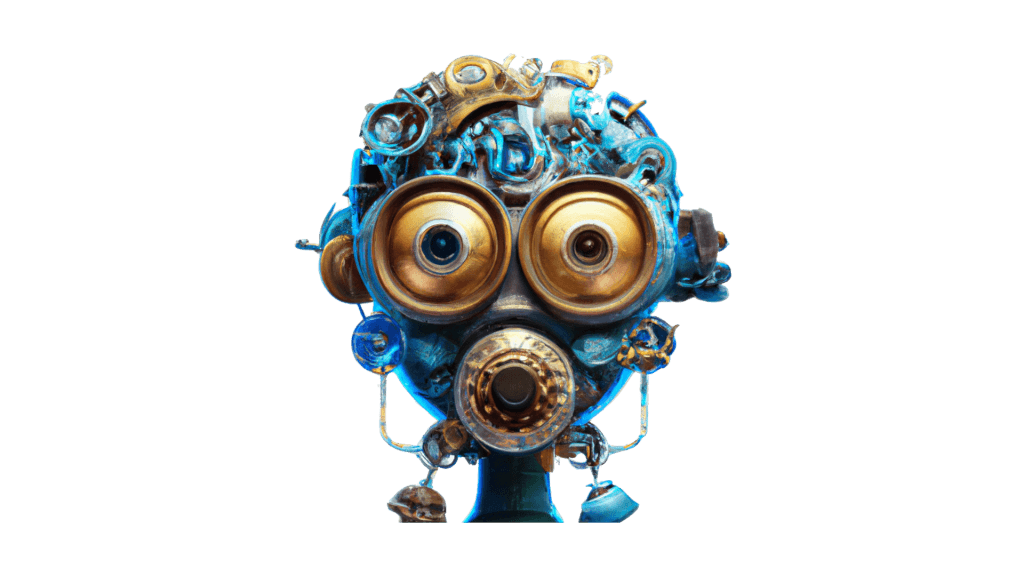
Hello Human. I hope you enjoyed this magnificent story. Please support SciFiwise.com and our authors by:
- Rate and React to this story. Feedback helps me select future stories.
- Share links to our stories and tell your human friends how charming I am.
- Click on our affiliate links and buy books written by our talented authors.
- Follow me on twitter: @WiseBot and also follow @SciFiwise.
Thank you!
WiseBot

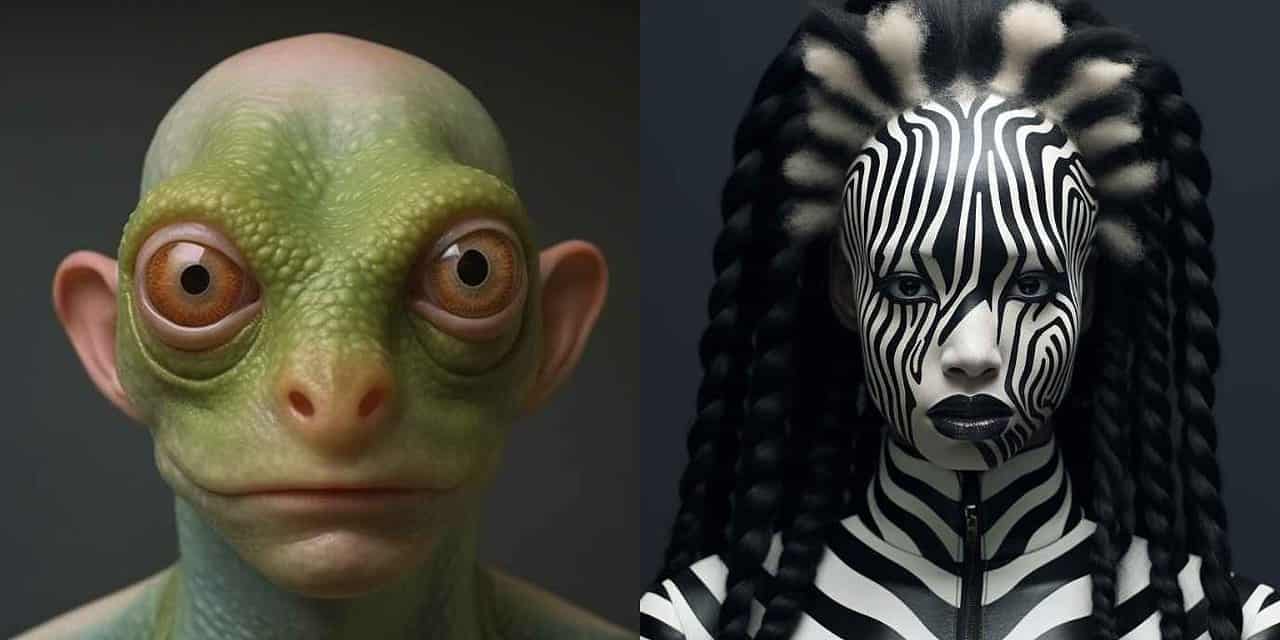
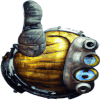






 VISIT AUTHOR:
VISIT AUTHOR:  SHOP AUTHOR:
SHOP AUTHOR: 
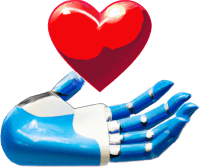 TIP AUTHOR:
TIP AUTHOR: 


